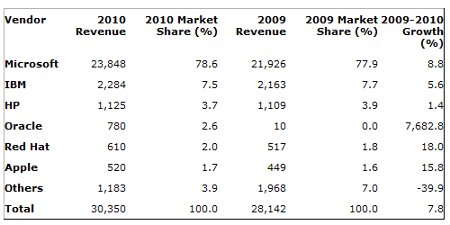Windows still rules OS roost, but Linux and Mac growing faster, says Gartner
Apr 27, 2011 — by LinuxDevices Staff — from the LinuxDevices Archive — 1 viewsThe worldwide market for operating system software grew nearly eight percent to $30.4 billion in 2010, led by Microsoft Windows with 78.6 percent market share, says Gartner. Yet Linux was the fastest growing server OS, and Apple's Mac OS had the fastest growth on the desktop, says the research firm.
Gartner's latest analysis covered server and client operating systems, though it should be noted that smartphones and embedded devices were not included. According to the research firm, worldwide server/client operating system (OS) revenue grew 7.8 percent to $30.4 billion in 2010, with Microsoft Windows continuing to lead the market by a wide margin.
Linux server and Mac OS were the fastest-growing sub-segments in the server and client OS segments, respectively. Meanwhile while Microsoft maintained its leading position in the overall OS market, with 78.6 percent market share.
"Generally, client OSes outperformed server OSes and grew 9.3 percent in 2010, while the server OS segment grew 5.7 percent," said Matthew Cheung, principal research analyst at Gartner, in a statement. "The long-pending demand for PC refreshment was unleashed as the economy stepped out from the economic turndown, which drove growth of client OSes."

Worldwide 2010 OS revenue and market share by vendor (millions of dollars)
Source: Gartner
(Click to enlarge)
Mac OS grew 15.8 percent to a size of $520 million in 2010, fueled by the strong sales of Mac desktops and laptops. Apple's promoting Mac OS as a "cool" client computing OS has attracted a group of loyal customers on Mac devices and platforms, Gartner said.
Apple's continuous innovations in mobile devices such as tablets and phones have prompted sales of other Apple devices and will continue to drive Mac sales, the research firm said. Despite its surge, Apple still represents only 1.7 percent of the total OS market, estimates Gartner.
Microsoft's Windows client business had higher growth at 9.2 percent, compared with its Windows server business at 7.5 percent growth, the Gartner report showed. A new wave of PC refreshment after the economic recession was the major reason for the better-performing Windows client business.
Windows 7 also gained market acceptance as the successor to Windows Vista and XP, Gartner said. The projected EOL of XP in early 2014 drove enterprises to accelerate migration to Windows 7 in the second half of 2010.
In an April 22 blog post, Microsoft announced that Windows 7 had sold more than 350 million licenses in the 18 months it has been available. According to Microsoft, "Analyst firms like IDC estimate that more than 90 percent of businesses are currently in progress with their Windows 7 migrations."
While the great Windows 7 migration may well be underway, according to analytics firm Net Applications, Windows XP still holds 54.39 percent of the worldwide OS market, followed by Windows 7 with 24.7 percent.
Linux keeps rolling on the server
Linux was not even mentioned by Gartner on the desktop, but in the server OS market, the open source OS was said to be the fastest-growing sub-segment in 2010 as end users adopted more open-standard systems. Within the Unix OS market, meanwhile, IBM AIX had high single-digit growth, but Unix generally experienced modest or negative growth, says Gartner.
Stated, Alan Dayley, managing vice president at Gartner, "The EOL threat for Unix OSes such as Tru64 and NetWare pushed the 'other proprietary Unix' subsegment down 39.6 percent in 2010 as some vendors retired their proprietary Unix and moved users to more open systems."
The distant second- and third-place vendors behind Microsoft's 78.6 percent overall market share in 2010 were IBM and HP, with 7.5 percent and 3.7 percent share, respectively. Oracle climbed up the ranking from No. 8 in 2009 to No. 4 in 2010 by acquiring Sun Microsystems' Solaris business in April 2009.
Meanwhile, among the three OSes owned by IBM, AIX experienced the highest growth at 9.2 percent due to the popularity of Power Systems. The consolidation of the System p and System i platforms and the strategy to push more AIX contributed to the slow growth of System i at 2.7 percent in 2010, Gartner said.
Moreover, HP-UX was able to maintain modest growth at 3.7 percent in 2010. However, HP's revenue from proprietary Unix and other proprietary OSs continued to decline because of the discontinuation of Tru64 and a decline in shipments of business-critical systems, such as NonStop and OpenVMS.
Also, facing the realities of the market, Oracle's software revenue from Solaris declined 3.2 percent in 2010 as end users were skeptical about Oracle's commitment to the Solaris platform — although the company made several announcements to clear this anxiety, Gartner said. Oracle's Linux versions, also known as Unbreakable Linux, grew almost 200 percent in 2010, showing Oracle's strategy to lessen its dependence on other vendors' Unix or Linux OSes.
For its part, Red Hat has been dominating the commercial Linux server market, Gartner said. Revenue of Red Hat Enterprise Linux (RHEL) server license went up 18.6 percent to $592 million in 2010, claiming a 58.2 percent share of the Linux server market. The phenomenon demonstrates that the market has accepted Linux as a viable alternative to Unix and other proprietary OSes in mission-critical environments, says Gartner.
Availability
Additional information is available in the Gartner report "Market Share Analysis: Operating System Software, Worldwide, 2010." The nine-page, $1,295 report is available on the research firm's website.
Darryl K. Taft is a writer for eWEEK.
This article was originally published on LinuxDevices.com and has been donated to the open source community by QuinStreet Inc. Please visit LinuxToday.com for up-to-date news and articles about Linux and open source.